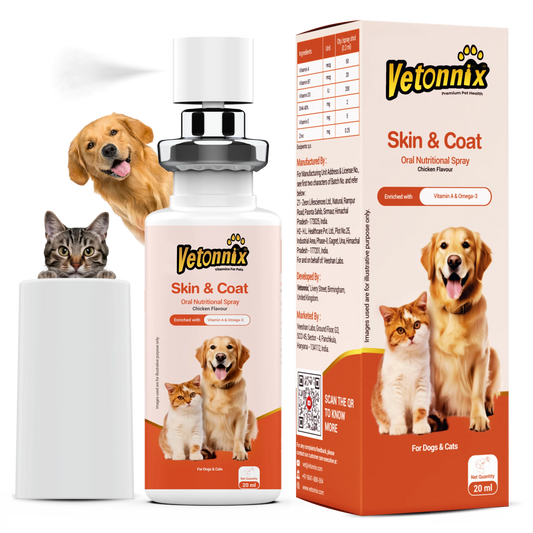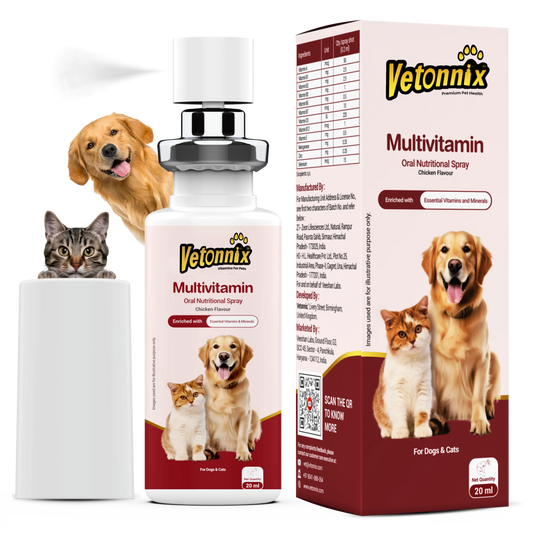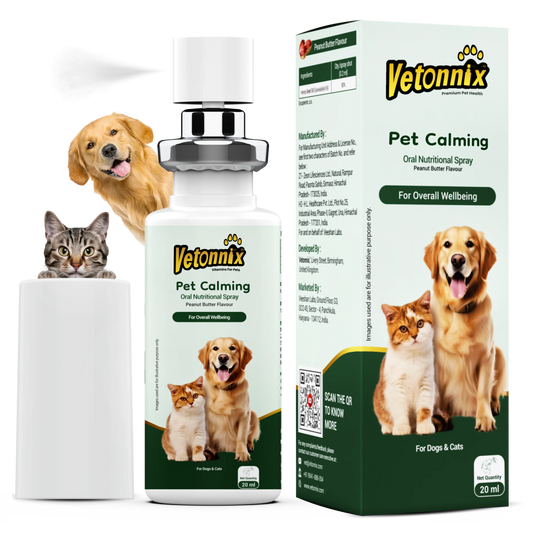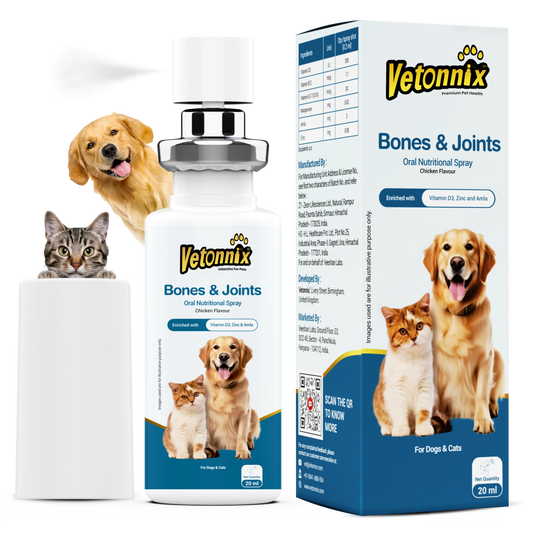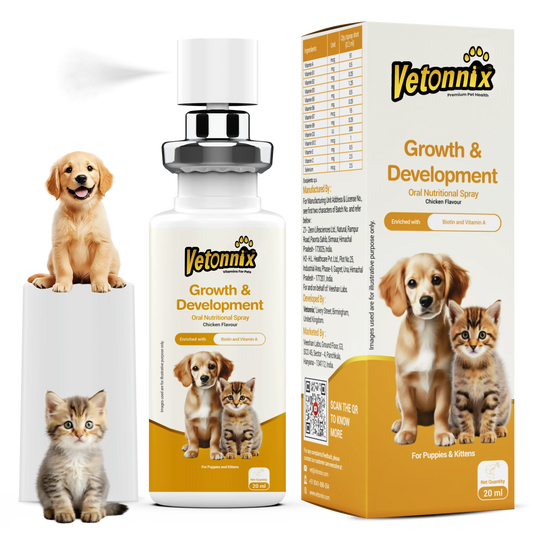We all want our pets to live long, healthy lives, and that starts with what we feed them. Whether it’s kibble, home-cooked meals, or a raw diet, we try to give them the best. But even with great care, essential nutrients can still fall through the cracks.
That’s where pet multivitamins come in. They don’t replace a healthy diet but they help cover the gaps that even premium foods miss. The result? Better energy, stronger immunity, and a shinier, healthier coat for your furry companion.
Why Your Dog Needs Multivitamins
Even the most well-intentioned diets can leave hidden nutritional gaps. From processed kibble to homemade meals, certain essential vitamins are often missing affecting your pet’s overall health in the long run.
Let’s break down why your dog may not be getting enough nutrients from food alone:
Kibble's Nutrition Paradox
Many pet owners assume kibble provides complete nutrition, but the truth might surprise you. One hidden shortcoming is that the high-temperature processing used in dry pet food breaks down vitamins B and C, which are essential for pets.
It does have a long shelf life due to added preservatives, but that reduces the nutrient quality. Moreover, most kibble uses synthetic vitamins that are less absorbable than natural forms.
The Raw Food Vitamin Myth
The raw/home-cooked diet that we give to our pets also has several shortcomings. Pet parents often rely heavily on muscle meat, which is naturally low in vitamin E but found abundantly in plants like spinach and grains.
Also, liver, which is quite common in raw diets, provides excess vitamin A but not enough vitamin B, which makes balancing of calcium/phosphorus ratios quite tricky without supplements.
Spotting the Signs
Several signs of poor nutrition in your dogs are thus noticeable. It is often noticed that brittle nails and slow wound healing are due to low biotin intake in our pets. The vitamin B1 deficiency leads to low energy levels and muscle weakness. Our pets are also prone to frequent infections due to weak immunity from lack of vitamins C or E in their diets.

The Most Overlooked Multivitamins for a Healthy Dog
Some vitamins are essential to your dog’s health but often go unnoticed in daily diets. These key nutrients play a big role in everything from energy levels to skin condition, and missing them can lead to visible health issues.
Here are some of the most commonly overlooked vitamins your dog needs:
Biotin (B7)
While eggs and liver contain biotin (B7), cooking destroys 50% of it, which is required for fatty acid production for good skin or coat health.
Deficiency symptoms include:
- Hair loss
- Red skin rashes
- Chronic ear infections
Vitamin B (B1 and B3)
- Vitamin B1 (thiamine) helps convert food to energy and combats fatigue. Its deficiency causes weakness and even wobbling when walking.
- Vitamin B3 (Niacin) helps support digestion by keeping gut lining healthy. Its absence leads to "black tongue" disease in dogs.
Also, do not forget vitamin E, which helps protect cells from damage and prevents flakiness , a common issue seen in our pets. Pets on fish-heavy diets also need extra Vitamin E. Some of the signs of its deficiency include muscle tremors or vision problems.

How Vetonnix Multivitamin Oral Spray Addresses These Gaps
With so many nutrients lost in processing or missing from raw/home diets, a multivitamin isn’t just helpful it’s essential. Vetonnix Multivitamin Oral Spray is designed to deliver those missing nutrients in a form that’s easy to absorb and stress-free to use.
Let’s look at how this innovative spray solves common supplement challenges:
Why Spray Works Better Than Pills
The research backed multivitamin Oral Nutritional Spray gets easily absorbed under the tongue , and goes directly into the bloodstream, bypassing the stomach acid. It is also ideal for pets with digestive issues (IBD, pancreatitis) that hinder pill absorption. Moreover , it also assists with no risk of choking or hiding pills in food by the pet parents, which is commonly seen with stubborn pets.
The Science Behind the Spray
The key ingredients in the spray, such as biotin and vitamin E, work together to repair dry skin and help reduce shedding. Also , while some vitamin C is produced naturally by dogs themselves, studies show that stress/illness increases their need for it more. Meanwhile , the B vitamins help convert food into usable energy, which reduces lethargy in them.
Dosage Flexibility
This is an adjustable spray that suits all breeds and age groups. Also, another added benefit is that it can be sprayed and mixed with food if your pet dislikes the direct application of it.
A Final Word on Your Pet’s Nutrition
While multivitamins cannot replace a balanced diet, they help fill the gaps that even quality pet foods sometimes miss. At the end of the day, we all want what's best for our furry friends. Good food, plenty of love, and proper care form the foundation, but sometimes our pets need a little extra nutritional support.
The truth is, no diet is perfect. Kibble loses nutrients during processing, home-cooked meals can be tricky to balance, and even premium raw diets might lack certain vitamins. That's where thoughtful supplementation can help.
Whether it’s more energy for playtime, a shinier coat, or just keeping their immune system strong, small steps can make a real difference over time.
FAQ: Common Questions About Pet Multivitamins
1. Can I use human vitamins for dogs instead?
No, human vitamins are not safe for pets. Many contain xylitol (toxic to dogs) or high iron levels. Pet vitamins are specially formulated for animal needs.
2. How do I know if my pet needs a vitamin supplement?
Look for dry, flaky skin, dull fur, excessive shedding, low energy, or recurring stomach issues. Seniors or pets recovering from illness may especially benefit.
3. Does Vetonnix Multivitamin Spray replace a balanced diet?
No, it complements a good diet. It fills nutritional gaps but doesn't replace protein, fat, or fiber. Think of it as a “nutritional safety net.”
4. How fast will I see changes in my pet with its use?
Energy boosts in 1–2 weeks. Skin/coat improvement in 4–6 weeks. Digestive support often in 2–3 weeks, especially for B-vitamin deficiency.
5. Is it safe for kittens/puppies?
Yes, it's safe for weaned pets (8+ weeks old). For pets under 6 months, use half the dose—1 spray instead of 2.




